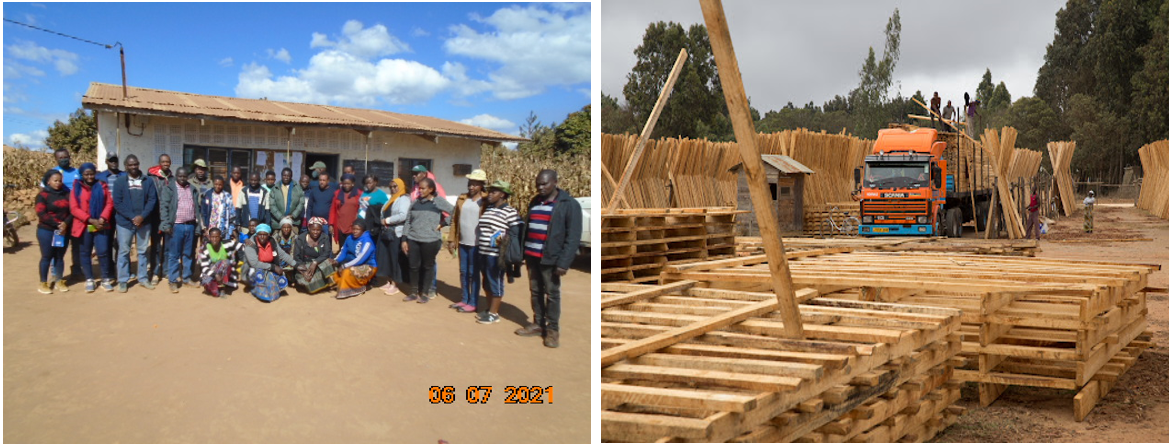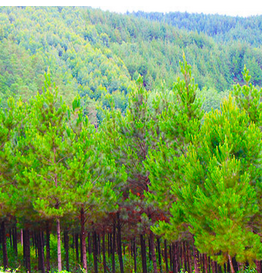A new hope has emerged for these growers in in the Njombe and Iringa regions, as two species of pine trees, Pinus patula and Pinus elliottii, have gained attention for their potential as sources of timber and sap.

image showing pinus patula tree nursery
Pinus patula, also known as the “African black pine,” is a highly valued timber tree that is native to the southern highlands of Tanzania. It is known for its high-quality wood, which is resistant to insects and decay, making it an ideal choice for furniture and construction. The demand for Pinus patula timber has been increasing in recent years, particularly in the construction industry, as it is a sustainable and durable alternative to non-renewable materials.

PInus patula field early performance in njombe region
Pinus elliottii, on the other hand, is a pine tree species that is native to the southeastern United States. It is also known as the “Southern yellow pine” and is highly valued for its sap, which is used to produce turpentine, a solvent used in paints, varnishes, and other industrial applications. The demand for Pinus elliottii sap has been increasing in recent years, particularly in the global paint and coatings industry, as it is a renewable and biodegradable alternative to synthetic solvents.
Pinus eliotii plantation
The potential of Pinus patula and Pinus elliottii as sources of timber and sap has gained attention from growers and investors in the Njombe and Iringa regions. The Tanzanian government has also recognized the potential of these species and has implemented policies to support the development of the pine tree industry in the region. For example, the government has established the Tanzania Forest Service, which is responsible for the management and regulation of forests in the country.

from the left is a group of researchers from Sokoine University of Agriculture under REFOREST programme and to the righ is Pinus patula plantation in mufindi district
In addition to the potential of Pinus patula and Pinus elliottii, the Njombe and Iringa regions also offer other opportunities for growers. The regions have a favorable climate for pine tree growth, with high altitudes and moderate temperatures. The soil is also well-suited for pine tree cultivation, with a mix of acidic and alkaline soils that provide the necessary nutrients for the trees to grow.
However, challenges still exist for pine tree growers in the Njombe and Iringa regions. One of the main challenges is forest fires, which limits the ability of growers to invest in their farms and expand their operations. Another challenge is the lack of market information, which makes it difficult for growers to know the demand for their products and the prices they can expect to receive.
To address these challenges, the Tanzanian government and private sector organizations have been working together to provide support to pine tree growers in the Njombe and Iringa regions. For example, the Tanzania Forest Service has established a program to provide financial support to growers, and private sector organizations such as the Tanzania Pine Tree Growers Association have been established to provide market information and other support to growers.
Sokoine University of Agriculture through department of ecosystem and conservation in the college of Forest, Wildlife and Tourism has done several research in iringa and Njombe region to address the challenges that local tree farmers faces in raising their woodlots so as to impact the quality and performance of woodlot. a recent study by Japhet Mwambusi published in the Tanzania Journal of Forestry and Nature Conservation assessed “The Silviculture of Woodlots of Smallholder Forest Producers in Mufindi District, Tanzania: Knowledge and Treatments” and revealed that more training is needed to strengthen smallholder forestry to ensure sustainable tree farming.
Njombe and Iringa regions in Tanzania’s southern highlands offer a new hope for pine tree growers, with the potential of Pinus patula and Pinus elliottii as sources of timber and sap. However, challenges still exist, and addressing these challenges will be crucial to the success of the pine tree industry in the region. With the support of the government, research institutions and private sector organizations, pine tree growers in the Njombe and Iringa regions can overcome these challenges and thrive in this promising industry.

